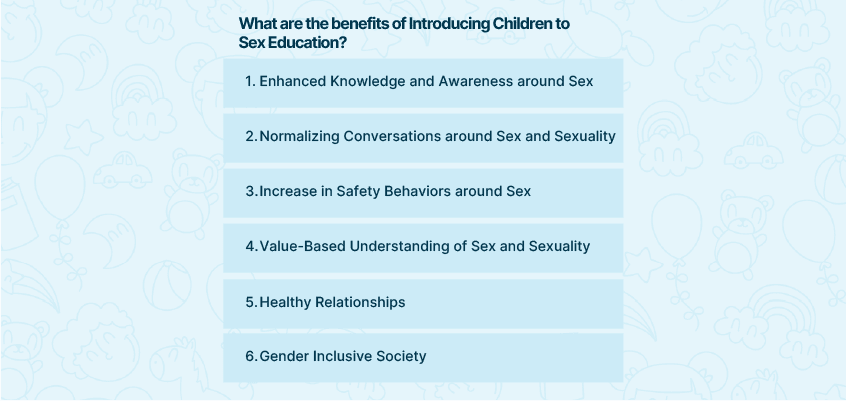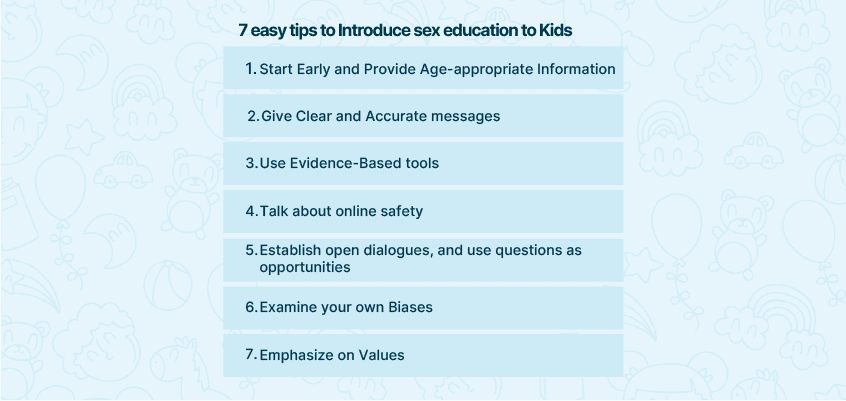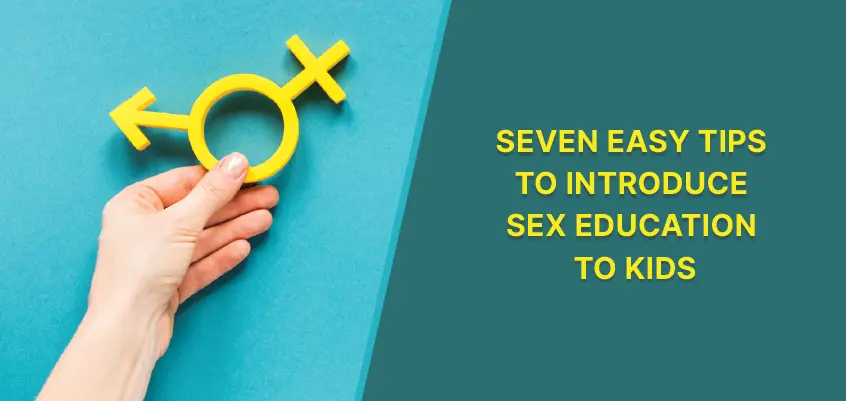Introduction
Sex education is an essential aspect of a child’s development and well-being. It helps in promoting healthy relationships, informed decision-making, and personal well-being. This can lay the foundation for a positive and responsible approach to sexuality. However, it may be a complex topic to initiate with children. This article will provide essential tips for introducing sex education to children.
Why is the Introduction of Sex Education To Kids Important?
Sex education is disseminating knowledge and skills related to bodily changes, sexuality, relationships, and sexual health. It empowers young individuals to make informed decisions and effectively communicate about sex [1]. Earlier, sex education was limited to bodily changes and sexual health. However, in 1994, the United Nations advocated for Comprehensive Sexuality Education for the well-being of children [2]. This education should include learning about the physical, social, cognitive, and emotional aspects of sex and sexuality [3].
Sex Education currently includes topics not only around human development and sexual health but also around relationships, values and cultural norms, gender, sexuality, gender-based violence, social pressures, and reproductive health provisions [2] [3].
When correct information about topics of sex and sexuality is provided by doctors, schools, parents, and trusted adults, children and adolescents become informed [4]. Instead of seeking information from unverified sources on the internet, they can have an open dialogue with trustworthy people in their vicinity. Thus, having provisions for comprehensive sex education is essential for the well-being, safety, and empowerment of children and adolescents. It helps adolescents understand their rights, develops values, and aids in effective decision-making around sex [2].
Must Read- Teenage pregnancy
What are the benefits of Introducing Sex Education To Kids?
Research on programs that implement sex education has shown positive outcomes regarding risky sexual behavior [2]. However, the benefits of sex education go beyond these health outcomes. Overall, the benefits of introducing sex education to children include:

Enhanced Knowledge and Awareness around Sex
Most children begin asking questions about bodies, babies, and sexual products or content they might be consuming unintentionally [4]. Sex education equips children with accurate information about reproductive systems, body changes, and sexual health, enabling them to understand their bodies better.
Normalizing Conversations around Sex and Sexuality
In many societies, conversations around sex and sexuality are taboo. Adults often parents try to avoid topics that revolve around sex, and this increases the risk of children hiding doubts, diseases, and abuse around sex. Sex education and early conversation can normalize sex as a part of a healthy life [4].
Increase in Safety Behaviors around Sex
Sex education increases safety behaviors like delay in having sex in girls, use of condoms, and reducing STIs and pregnancies [2]. Educating children about sexual abuse prevention, consent, and healthy boundaries empowers them to recognize and protect themselves from potential harm. Correct information about sexual behavior online is also required [5].
Value-Based Understanding of Sex and Sexuality
Some authors contend that sex education is closely linked with value education [6]. When discussing sex education, discussion around consent, boundaries, respect, and no harm to others often ensues.
Healthy Relationships
Teaching children about communication, respect, consent, and mutual understanding has also affected partner selection in research studies [7]. Often teenage girls are at risk of being manipulated in the name of love and relationships. Sex education can help build an idea of a meaningful relationship in children [6].
Gender Inclusive Society
Since sex education includes conversations on gender identity, power structures, and sexuality, educating children about gender identity and sexual orientation fosters inclusivity, empathy, and respect for diversity. This can foster an inclusive society.
Read more about- How Do I know My Sexual Orientation
7 Easy Tips To Introduce Sex Education To Kids

It is evident that sex education has many benefits, and children require an
introduction to it. However, it may be a complex topic to approach with children, and here are seven effective tips for doing the same.
- Start Early and Provide Age-appropriate Information: Adults should introduce sex education gradually and begin early. At an early age, around kindergarten, children can be introduced to their bodies and body parts [8]. It is vital to use the correct terms such as penis, vulva, bum, etc. Fundamental understanding of consent, what can and cannot be touched, and saying no to others, can also be introduced below the age of 5. As the child grows up, topics like masturbation, pornography, and changes to be expected in puberty can be discussed. Eventually, one can bring in concepts of gender, sexuality, sexual health, reproduction, and safety [8].
- Give Clear and Accurate messages: Using correct terms and giving concrete messages is essential. Accurate messages mean medically and scientifically correct messages. For instance, one needs to provide specific risk and protective factors when discussing preventing STIs and early pregnancy [2]; accurate terminology when discussing body parts and functions helps remove stigma and confusion.
- Use Evidence-Based tools: Sex education must be informed by evidence [1], for children have a right to correct information. One can also use various tools such as checklists, books, charts, and other resources which are available online [9].
- Talk about online safety: With access to apps that can connect children and teens globally, the risk of releasing private information or becoming groomed for sexual abuse has increased. Discussion around the potential dangers of sharing personal information online, the importance of privacy settings, and the possible consequences of engaging in inappropriate or harmful online activities need to happen [8].
- Establish open dialogues, and use questions as opportunities: Often children are curious and ask questions about sex, sexuality, and relationships. These questions can be used as opportunities to introduce sex to children. Creating a safe and non-judgmental space where children feel comfortable asking questions and expressing their concerns can be a gateway to sex education, especially at home.
- Examine your own Biases: Sex is a value-laden topic, and each community and religion has a different view on sex and what is “right” when it comes to sex [6]. It is essential to reflect on these views before providing sex education. While sex education needs to be value-based (for instance, the value of respect can be taught alongside consent), it must not have biases and imposition of right and wrong (for example, sex before marriage is a sin).
- Emphasize Values: As mentioned before, values must be reflected in sex education [6]. Comprehensive sex education will involve gender, sexuality, sexual violence, and bodily autonomy. Along with this, discussion on healthy relationships, love, tolerance, and integrity are some aspects that can be introduced in sex education [6].
More information about- Child Counselling of Kids and Teens
Conclusion
Introducing sex education to children is crucial in developing a healthy outlook toward sex and sexuality. Adults around a child can introduce sex education by embracing open and honest conversations, providing accurate information, starting early, and introducing values to children.
If you want to introduce your child to sex education, you can seek help from experts at United We Care. At United We Care, our team of wellness and mental health experts can guide you with the best methods for your and your children’s well-being.
References
- “Sexuality education,” Advocates for Youth, https://www.advocatesforyouth.org/resources/fact-sheets/sexuality-education-2/ (accessed May 13, 2023).
- Comprehensive sexuality education – GSDRC, https://gsdrc.org/wp-content/uploads/2015/09/HDQ1226.pdf (accessed May 13, 2023).
- J. Herat, M. Plesons, C. Castle, J. Babb, and V. Chandra-Mouli, “The Revised International Technical Guidance on sexuality education – a powerful tool at an important crossroads for sexuality education,” Reproductive Health, vol. 15, no. 1, 2018. doi:10.1186/s12978-018-0629-x
- “Sex education and talking with children about sex: 0-8 years,” Raising Children Network, https://raisingchildren.net.au/school-age/development/sexual-development/sex-education-children (accessed May 13, 2023).
- J. D. Brown, S. Keller, and S. Stern, “Sex, sexuality, sexting, and sexed: Adolescents and the media,” PsycEXTRA Dataset, 2009. doi:10.1037/e630642009-005
- Siecus, https://siecus.org/wp-content/uploads/2015/07/20-6.pdf (accessed May 13, 2023).
- C. C. Breuner et al., “Sexuality Education for Children and Adolescents,” American Academy of Pediatrics, https://publications.aap.org/pediatrics/article/138/2/e20161348/52508/Sexuality-Education-for-Children-and-Adolescents?autologincheck=redirected (accessed May 13, 2023).
- “How to talk to kids about sex,” Today’s Parent, https://www.todaysparent.com/family/parenting/age-by-age-guide-to-talking-to-kids-about-sex/ (accessed May 13, 2023).
- P. Parenthood, “Resources for parents,” Planned Parenthood, https://www.plannedparenthood.org/learn/parents/resources-parents (accessed May 13, 2023).





